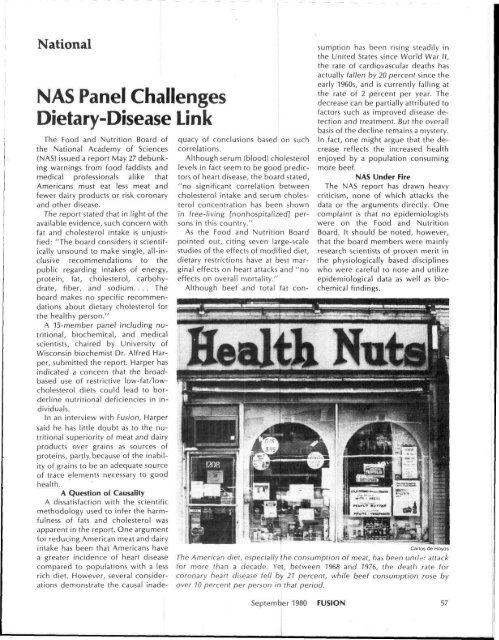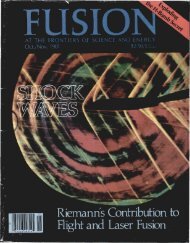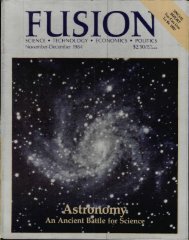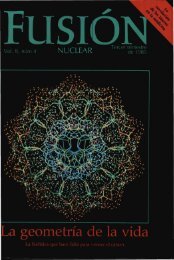system that combined the KrF with a nonlinear laser beamplasmainteraction system that compressed the KrF laserbeam into a high-power, short pulse.This hybrid system, called Rapier, is only at the experimentalstage. Its major drawback is that even if it worksperfectly, 50 percent of the laser beam is lost during thenonlinear laser-plasma compression stage, which decreasesthe overall efficiency of the laser by one-half,bringing it down to below 4 percent.New technological advances were made in developingthe KrF, just as the Foster Committee was completing itsreport. Although these new developments do not lead tothe extremely short laser pulse originally projected bylaser <strong>fusion</strong> scientists (0.1 to 1 nanosecond), they meetthe requirements for the longer-pulse, high-aspect ratio,multishell targets. Furthermore, the new KrF technologyappears to have no significant impediments to beingcheaply scaled up to higher total energies. Thus, the newKrF could readily proceed to higher total energies ontarget, if need be, in a brute force campaign to achievehigh target gains.A year has passed since the Foster Committee heard theoriginal testimony on the KrF and in this time researchershave confirmed the capabilities needed to realize a successfulkrypton fluoride laser as well as initial cost andconstruction time projections. As a result, the KrF not onlyis the best candidate for meeting the needs of inertialconfinement <strong>fusion</strong> in terms of wavelength and total<strong>energy</strong>, but also could achieve the program's scientificgoals at 10 times less cost than glass lasers.To pursue an aggressive experimental program in inertialconfinement <strong>fusion</strong>, scientists need the appropriatetools. Although glass lasers and other drivers currently inuse will continue to provide much of the informationneeded, the KrF laser is a new technology that can berealized within the next four to six years and provide thekey parameters of <strong>energy</strong> and wavelength needed toensure experimental success. The costs of pursuing theKrF at this time are very small, but the eventual costs tothe nation for failing to pursue the KrF could be incalculable.Charles B. Stevens is the <strong>fusion</strong> technology editor ofFusion magazine.Notes1. "Budget Has Net Cut for Laser Program." Fusion, May 1980, p. 65.2. "New Foster Report Under Wraps," Fusion, Sept. 1979, p. 24.3. Theoretical and technical aspects of inertial confinement <strong>fusion</strong> havebeen discussed fully in previous articles in Fusion. Specifically, for anoverview of inertial confinement, including the deficiencies of computermodels with respect to compression shock waves and thermonuclearignition, see the articles on <strong>fusion</strong> in the March-April, February, andNovember issues of Fusion; on target designs that could be ignitedwith ordinary chemical explosives, see "The Secret of Laser Fusion,"March-April 1979. p. 38; on isentropic compression (the technical termfor efficient compression of matter to high densities), see "The TheoreticalImpasse in Inertial Confinement Fusion," Nov. 1979, p. 33; onhow advances in inertial confinement could provide the theoretical keyto the way supernovas and other super<strong>energy</strong> cosmological eventstake place, see Aug. 1980, p. 70.4. Ft.E. Kidder, LRL Laser Research Program, COTM-63-7, 1963 (unpublished).5. "LLL Proven Right on Laser Absorption," Fusion, May 1980, p. 67.6. R.E. Kidder and J.W. Zink, Nuclear Fusion 12:325 (1972).7. "LLL Double Shell Target Achieves Compression Advance," Fusion,July 1980, p. 68.8. Fusion, May 1980, p. 25.other than solid state materials couldovercome the heat transport and efficiencyproblems of glass laser systems.This is particularly the case withgas lasers, in which the lasing mediumis excited by an electron beam. Withthe discovery of the lasing propertiesof krypton fluoride gas (KrF) as wellas other halogen compounds, in 1975scientists achieved the possibility ofan efficient gas laser with the appropriatewavelength for inertial confinement<strong>fusion</strong>.The particular advance that hasmade KrF a promising candidate isangular multiplexing. With a simpleKrF laser driven by an electron beam,the shortest pulse that can be extractedwith the maximum efficiency(about 8 percent) is 300 nanoseconds.In other gas lasers a shorter pulselength can be efficiently obtained bypassing a series of short pulsesthrough the same excited lasing medium(multipassing). Using optical delaylines, the first pulse of laser lightextracted from the excited gas is opticallyreflected along a path that islong enough so that the second, third,and other pulses can catch up, formingone powerful beam.Because krypton fluoride has sucha short lifetime (about 5 nanoseconds),a special form of multipassing,angular multiplexing, is used. A seriesof short pulses is directed through theKrF amplifier, passing through themedium almost simultaneously, witheach of the initial pulses directed ata different angle through the KrF amplifier.For example, since <strong>energy</strong> must beextracted for 300 nanoseconds in ord^rto reach the highest efficiency, ifresearchers want a pulse of 10 nanosecondsduration, then 30 separateinitial pulses will have to be passedthrough the KrF amplifier within that300 nanoseconds. The overall systemof angular multiplexing is well withinthe existing state of the art, in termsof materials and procedures.The cost for building a 100-kilojouleKrF laser with a 10-nanosecond, 100-trillion-watt laser output is estimatedto be between $20 and $30 million,and will decrease proportionately asthe KrF system scales up. This is buta fraction of the cost projected forthe 100-trillion-watt Nova glass systemunder construction at Lawrence LivermoreLaboratory.A 1-million-joule glass laser, thelargest laser considered technologicallyachievable within the next decade,would cost nearly $1 billion ormore to build and would not be readilycapable of scale-up in <strong>energy</strong> beyondthe 1 million joules. In comparison,a 1-million-joule KrF laser wouldcost between $200 and $300 millionand could be scaled up.September 1980 FUSION 55
NationalNAS Panel ChallengesDietary-Disease LinkThe Food and Nutrition Board ofthe National Academy of Sciences(NAS) issued a report May 27 debunkingwarnings from food faddists andmedical professionals alike thatAmericans must eat less meat andfewer dairy products or risk coronaryand other disease.The report stated that in light of theavailable evidence, such concern withfat and cholesterol intake is unjustified:"The board considers it scientificallyunsound to make single, all-inclusiverecommendations to thepublic regarding intakes of <strong>energy</strong>,protein, fat, cholesterol, carbohydrate,fiber, and sodium. . . . Theboard makes no specific recommendationsabout dietary cholesterol forthe healthy person."A 15-member panel including nutritional,biochemical, and medicalscientists, chaired by University ofWisconsin biochemist Dr. Alfred Harper,submitted the report. Harper hasindicated a concern that the broadbaseduse of restrictive low-fat/lowcholesteroldiets could lead to borderlinenutritional deficiencies in individuals.In an interview with Fusion, Harpersaid he has little doubt as to the nutritionalsuperiority of meat and dairyproducts over grains as sources ofproteins, partly because of the inabilityof grains to be an adequate sourceof trace elements necessary to goodhealth.A Question of CausalityA dissatisfaction with the scientificmethodology used to infer the harmfulnessof fats and cholesterol wasapparent in the report. One argumentfor reducing American meat and dairyintake has been that Americans havea greater incidence of heart diseasecompared to populations with a lessrich diet. However, several considerationsdemonstrate the causal inadequacyof conclusions based on suchcorrelations.Although serum (blood) cholesterollevels in fact seem to be good predictorsof heart disease, the board stated,"no significant correlation betweencholesterol intake and serum cholesterolconcentration has been shownin free-living [nonhospitalized] personsin this country."As the Food and Nutrition Boardpointed out, citing seven large-scalestudies of the effects of modified diet,dietary restrictions have at best marginaleffects on heart attacks and "noeffects on overall mortality."Although beef and total fat consumptionhas been rising steadily inthe United States since World War II,the rate of cardiovascular deaths hasactually fallen by 20 percent since theearly 1960s, and is currently falling atthe rate of 2 percent per year. Thedecrease can be partially attributed tofactors such as improved disease detectionand treatment. But the overallbasis of the decline remains a mystery.In fact, one might argue that the decreasereflects the increased healthenjoyed by a population consumingmore beef.NAS Under FireThe NAS report has drawn heavycriticism, none of which attacks thedata or the arguments directly. Onecomplaint is that no epidemiologistswere on the Food and NutritionBoard. It should be noted, however,that the board members were mainlyresearch scientists of proven merit inthe physiologically based disciplineswho were careful to note and utilizeepidemiological data as well as biochemicalfindings.Carlos de HoyosThe American diet, especially the consumption of meat, has been under attackfor more than a decade. Yet, between 1968 and 1976, the death rate forcoronary heart disease fell by 21 percent, while beef consumption rose byover 10 percent per person in that period.September 1980 FUSION 57
- Page 2 and 3:
FUSIONMAGAZINE OF THE FUSION ENERGY
- Page 4 and 5: of the Academy drew an editorial bl
- Page 6 and 7: LettersRiemann Vs. Darwin:Evolution
- Page 8 and 9: LettersContinued from page 7The Aut
- Page 10 and 11: News BriefsCarlos de HoyosUwe Parpa
- Page 12 and 13: News BriefsU.S. BUDGET CUTS TARGET
- Page 14 and 15: Special ReportWhy MonetarismDestroy
- Page 16 and 17: according to Mitchell, the seminal
- Page 18 and 19: the worst accident that could possi
- Page 20 and 21: subways), fossil-fueled power plant
- Page 22 and 23: should be started now, Levitt state
- Page 24 and 25: TheNASAStoryThe Fight forAmerica'sb
- Page 26: To one leading military faction at
- Page 29 and 30: created since the midcentury, in at
- Page 31 and 32: created the rockets and all the ins
- Page 33: While the military and the presiden
- Page 36 and 37: James E. Webb (right), the NASA adm
- Page 38 and 39: NASAAnatoly Dobrynin (foreground),
- Page 40 and 41: TheNATOPlan to KillUS. Scienceby Ma
- Page 42 and 43: Europe, Bertrand de Jouvenel, himse
- Page 44 and 45: could well be a "three-way split; i
- Page 46 and 47: mation of a U.S. Association for th
- Page 48 and 49: continued development of high-power
- Page 50 and 51: intense beam of laser light, ions,
- Page 52 and 53: toward the generation of "hot" elec
- Page 56 and 57: Others have charged that scientists
- Page 58 and 59: AAAS-Brookings Conf.:Nonscience Age
- Page 60 and 61: Siberian development is at thecente
- Page 62 and 63: tition from the antinuclear Union o
- Page 64 and 65: as the primary driver to implode th
- Page 66 and 67: A CDC spokesman said that thenew sy
- Page 68 and 69: Space Science& TechnologyThe Solar
- Page 70 and 71: hoto by C. Srinivasen/United Nation
- Page 72 and 73: 1975. This index has been at or bel
- Page 74 and 75: course, the primary cooling systemi
- Page 76 and 77: _The Young Scientist.What IsEnergy?
- Page 78 and 79: Lyndon LaRoucke, Democrat for Presi
















